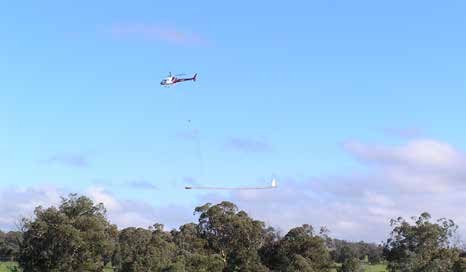UPFRONT news

What price water?
Water is a big issue throughout the State. While there is concern among growers about allocations being scaled back (see our Discuss story, p14), Manus Stockdale, former business and projects manager at vegetablesWA, says there is a mix of relief and disappointment over the recent halting of the Water Reform Bill. “We were apprehensive about the Water Reform Bill and unhappy with the way the State Government was going about water reform and the writing of the new Bill,” he says, explaining consultation on the Bill occurred about 10 years ago and much has changed since then. “Growers rely on water to produce the food that the WA public rely on, so they need certainty from government about access to water. We, as vegetablesWA, want government to be transparent about changes to water policy and regulations, and how they are applied to growers at a regional level.” He said it was also important that government continued to consult with industry so we can understand what changes are being made and provide advice on how the changes will impact growers. “The WA Government needs to prioritise and value local food production and ensure food producers have ongoing, secure access to water and can plan the longer term with certainty.”

A transmitter and receiver coils mounted in a frame hang below the helicoptor.
Aerial Survey of Groundwater in Great Southern
DPIRD has joined forces with the CSIRO and local governments to map groundwater resources in the Great Southern. A helicopter will be used to conduct an aerial electromagnetic (AEM) survey of the Beaufort River area across the shires of Woodanilling, West Arthur and Kojonup. DPIRD senior principal research scientist Richard George said the Beaufort palaeochannel survey would help to identify groundwater resources and suitability for agriculture and community use. “The information will be used to map the aquifer and complete a groundwater resource assessment,” Dr George said. The two-week survey began in late April and covered about 67,000 hectares.
Trial Partnership
From Paddock to Produce
Verigrow trials begin on West Australian horticulture farm.

One of Western Australia’s most innovative companies, Veratin, has started its rollout of Verigrow trials with vegetablesWA and West Australian growers. The company extracts proteins from sheep’s wool to create cutting-edge fertilisers, soil improvers and soil wetters. We will be reporting on the progress of this initial, and future, trials. As the industry looks to sustainable farming options, vegetablesWA is doing its bit to partner with innovative companies that could provide the answers. For more on the trials, contact RDO Chi Nguyen on 0457 457 559 or email chi.nguyen@vegetableswa.com. au. Learn more about Veratin and Verigrow at veratin.com.au and verigrow.com.au.
Gascoyne Gourmet
Fresh produce 2024 launch draws a huge crowd.

It was all about taste when the produce from Gascoyne farmers and fishers converged on Gage Roads in Fremantle in February. The first event of the Gascoyne Food Festival, the Summer Canape Sundowner saw growers, fishers, supporters, government representatives and hospitality professionals come together on the docks in Fremantle to celebrate West Australian, specifically Gascoyne, fresh produce. The Gage Roads kitchen team did the produce proud as they worked with tropical fruits, seafood, vegetables and meat to create mouth-watering canapes that put the actual taste of the produce front and centre. It was a heaving crowd, which spilled out onto the front veranda of the venue, which paid its respects to the suppliers, signalling a successful festival season for the Gascoyne food growers.
Supermarket Submission
AUSVEG lodges solutions to Senate Select Committee on grower-retailer power imbalance.
AUSVEG has lodged its submission to the Senate Select Committee on Supermarket Prices, calling on reforms to address supply chain power imbalances. It’s this issue that is credited with threatening the viability of Australian vegetable-growing businesses. AUSVEG has also recently completed a new industry sentiment survey, which reveals 37 per cent of growers are considering leaving the industry in the next 12 months. That’s up from 34 per cent last year.
While vegetable growers pointed to input cost increases, poor retail pricing and labour costs as the top three reasons vegetable-growers are considering closing their farms, issues raised as part of the submission included: a lack of certainty in arrangements with retailers in relation to price and volume, disproportionate risk and compliance burden, a lack of negotiating power, asymmetrical information flow and concerns over various behaviours that could be in breach of the Food and Grocery Code of Conduct. The lack of independent arbitration or other effective recourse actions that address fear of retribution were also brought up as hampering growers’ efforts to have their issues resolved.
“As Australian vegetable growers continue to face livelihood-threatening challenges that are driving the cost of supplying vegetables higher and higher, it is crucial to ensure growers receive fair and sustainable farm-gate prices for their produce,” says AUSVEG CEO Micheal Coote. “Instead, growers tell us they are under more and more pressure from retailers to accept lower and lower prices, and often have few options but to do just that. A major contributing factor is the concentration of market power in the hands of retailers that are often the biggest customer for many vegetable growers.
“With our latest survey confirming sentiment is at an all-time low in the sector and getting worse, this inquiry is an opportunity to embrace reforms that support the long-term viability of the vegetable growing businesses that feed the country.”
Recommendations put forward in the submission include: providing greater certainty for growers in arrangements with retailers, making the Australian Food and Grocery Code of Conduct mandatory, introducing enforceable penalties and fines for breaches, and the introduction of a genuinely independent complaints and arbitration mechanism.
“While fair and sustainable prices ... at the farm gate are a crucial part of the equation, they are just one part of a complex range of challenges,” says Coote. “Unless we see changes that address the multitude of issues contributing to growers’ margin squeeze, then more and more farmers will leave the industry, causing prices to increase for consumers.”